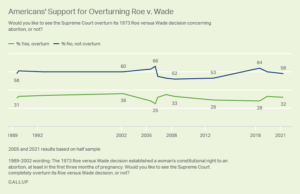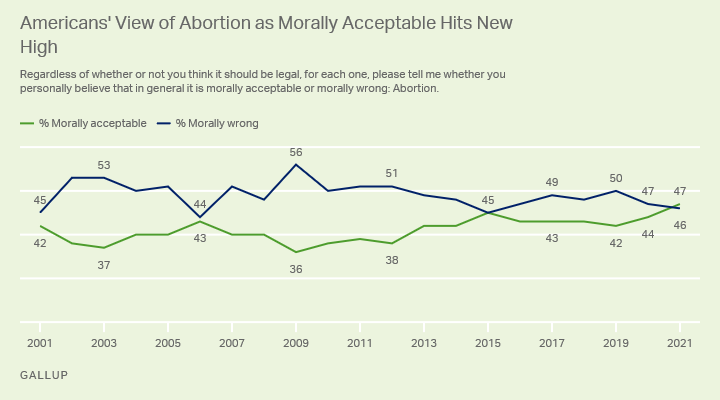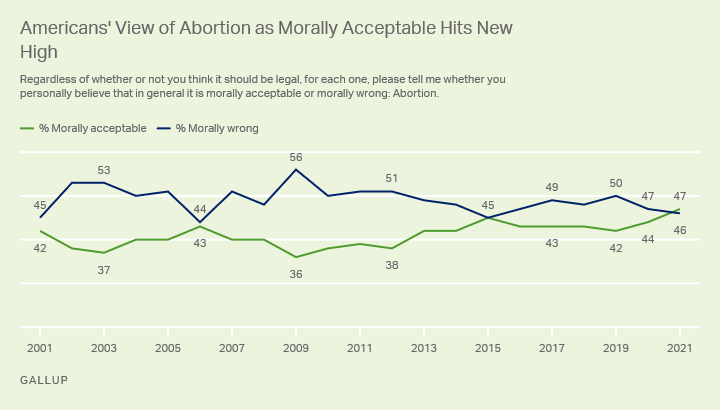The composition of the United States Supreme Court may have tilted on abortion, but the majority sentiment of the American public has not changed similarly.
As with other key social issues most frequently espoused by religious conservatives — including immigration,LGBTQ rights and capital punishment — if laws were enacted based on majority public opinion, they would not toe the conservative line.
That’s the finding of yet another set of polling about abortion conducted in May and released June 9 by Gallup.
Gallup found a third of Americans (32%) believe abortion should be legal in all circumstances, while 48% believe it should be legal in certain circumstances, and 19% believe it should be illegal in all circumstances.
 “’Overturning Roe v. Wade’ is a shorthand way of saying the Supreme Court could decide abortion is not a constitutional right after all, thus giving control of abortion laws back to the states. This does not sit well with a majority of Americans or even a large subset of Republicans,” Gallup reported. “Not only do Americans oppose overturning Roe in principle, but they oppose laws limiting abortion in early stages of pregnancy that would have the same practical effect.”
“’Overturning Roe v. Wade’ is a shorthand way of saying the Supreme Court could decide abortion is not a constitutional right after all, thus giving control of abortion laws back to the states. This does not sit well with a majority of Americans or even a large subset of Republicans,” Gallup reported. “Not only do Americans oppose overturning Roe in principle, but they oppose laws limiting abortion in early stages of pregnancy that would have the same practical effect.”
This has practical application in states, where Republican-controlled legislatures have enacted severe abortion restrictions with claims that they are doing the will of the people.
According to Gallup, the will of the people is much more nuanced than partisan politics.
For example, Gallup found Americans remain sharply divided on the morality of abortion, with an equal split between those who believe it is morally acceptable (47%) and those who say it is morally wrong (46%). The share of those who believe it is morally acceptable is growing, however, and currently sits at the highest level Gallup has measured in two decades.
On the politics of abortion, however, the majority public view is clearer — and it does not align with Republican priorities.
The new report finds 58% of Americans oppose overturning the 1973 Roe v. Wade decision, compared to 32% who favor striking down Roe. Those numbers match the average of three decades of polling data collected by Gallup. Since 1989, between 52% and 66% of U.S. adults have favored keeping Roe intact.
Attitudes on specific situations
One of the ways state legislators have sought to undermine abortion rights is by creating restrictions based on specific circumstances or timelines.
For example, some states have passed so-called “fetal heartbeat” measures that would ban abortions after about the sixth week of pregnancy, when an embryonic heartbeat can first be detected.
The future of the Roe decision is more uncertain than ever because a new conservative majority on the Supreme Court has agreed to take up a challenge to a Mississippi law prohibiting abortion after 15 weeks of pregnancy. Roe specifies that states may not ban abortion before the time of “fetal viability,” which was determined to be 24 to 28 weeks into a pregnancy.
Gallup’s latest poll tested attitudes on three of the most common restrictions placed on abortion by state legislatures. It found:
- 56% of Americans oppose banning abortions after the 18th week of pregnancy, a threshold used in laws passed in Arkansas and Utah and currently facing court challenges.
- 58% oppose banning abortions once the heartbeat of a fetus can be detected.
- 57% oppose generally banning abortion if performed because the fetus is found to have a genetic disease or disorder.
Variations in attitudes by group
Gallup found majorities of Americans across most demographic subgroups oppose further bans on abortion. The trend holds across gender, age and race.
Political affiliation is a more dominant indicator of attitude, however. Republicans are much more likely to support nearly all bans on abortion than are Democrats, which is not new. However, Gallup found that even among Republicans, only 57% favor prohibiting abortion after the 18th week, while 54% favor prohibiting abortion once a fetal heartbeat can be detected. And on the issue of genetic disorders, less than half (49%) of Republicans want laws to ban abortion while 48% oppose such laws.
Less than half of Republicans (46%) favor overturning Roe v. Wade, while 43% of Republicans oppose overturning the landmark ruling.
When should abortion be legal?
Gallup also reported data on when Americans do think abortion should be legal:
- 48% believe it should be legal “only under certain circumstances.”
- 32% believe it should be legal “under any circumstances.”
- 19% believe it should be “illegal in all circumstances.”
“The nearly one-third of U.S. adults who support fully legal abortions is the highest such percentage since the early to mid-1990s, when it was consistently at that level,” Gallup noted. And when those who favor allowing abortion in some or all circumstances are taken together, fully 80% of Americans want to allow at least some abortions — contrary to abortion opponents’ desire to outlaw all abortions.
The demographic groups Gallup found most likely to want the most restrictive policies on abortion are Republicans, men, older adults, those without college degrees, and conservatives.
Related articles:
When being ‘pro-life’ really isn’t: How I became a Democrat who opposes abortion | Analysis by Chris Conley
As state legislative sessions come to an end, anti-abortion bills are rising to the top
Is this election all about abortion? It depends on who you ask | Analysis by Mark Wingfield
Why we need to talk about abortion | Opinion by Russ Dean


